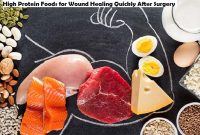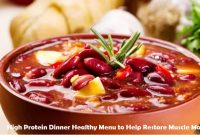High-protein vegetarian meals are a healthy choice as they provide essential nutrients without excess saturated fat and cholesterol. Foods like tofu, tempeh, beans, and quinoa not only provide adequate protein, but also fiber, vitamins, and minerals that support overall health. A plant-based diet can help maintain a healthy weight, reduce the risk of heart disease, and improve overall well-being.

High-Protein Vegetarian Meals Options
More and more people are turning to vegetarian and vegan lifestyles, both for personal health and for environmental reasons. However, one common myth is that it’s difficult to get adequate protein intake from plant-based foods.
Not to worry! There are plenty of protein-rich vegetarian options that can fulfill your nutritional needs. Here are some high-protein vegetarian food options that can be the perfect addition to your diet.
Tofu and Tempeh
Tofu and tempeh are great sources of plant-based protein. Both products are made from fermented soybeans, and they are not only rich in protein but also contain fiber, iron, and calcium. You can cook tofu and tempeh in various ways, such as fried, boiled, or stir-fried. They are also able to absorb the flavor of seasonings well, making them suitable for many different types of dishes.
Beans and Soybeans
Pulses such as kidney beans, black beans, and peanuts are great sources of plant-based protein. They also contain fiber, vitamins, and essential minerals. In addition, soybeans and their derivative products such as soy milk and tofu are good alternatives for those looking for plant-based protein sources. Soy milk, for example, contains almost the same amount of protein as cow’s milk.
Quinoa
This is also a high-protein vegetarian meals. Quinoa is one of the highest protein-rich grains. Moreover, quinoa contains all the essential amino acids, making it a complete source of protein for vegetarians. You can use quinoa as a rice substitute or in salads, soups, or side dishes.
Green Vegetables
Green vegetables like spinach, broccoli, and kale are higher in protein than other vegetables. In addition, they also contain iron, calcium, and various other vitamins and minerals. Adding green vegetables to your daily diet is an easy way to increase your protein and nutrient intake.
Almonds and Walnuts
Almonds and walnuts are another example of high-protein vegetarian meals. They also contain healthy fats, fiber, and a variety of vitamins and minerals. You can consume them as a healthy snack or add them to salads and desserts.
Almonds and walnuts are two types of nuts that are very popular among vegetarians and vegans. In addition to their high protein content, these nuts are also rich in antioxidants that help protect the body’s cells from damage. Almonds, which have a slightly sweet taste, are often used as an ingredient in making almond milk, while walnuts with their crunchy texture are often used as a topping for cakes and muffins.
Processed Plant Products
Today, there are a variety of processed plant-based products that are specifically designed to provide a source of protein comparable to animal products. Examples of these products include plant-based burgers, plant-based sausages and plant-based nuggets. They are becoming increasingly popular in the market and can be a delicious and nutritious option.
It is important to remember that while there are many vegetarian food options that have a high protein content, it is also important to ensure variety in your diet. By mixing different sources of plant-based protein, you can ensure that you are getting all the essential amino acids required by the body.
According to the Instagram video @kalori.indo, consuming quinoa instead of rice helps maintain energy throughout the day. There are also those who feel healthier after routinely adding tempeh and tofu to their daily menu. Almonds and walnuts are often recommended as nutritious snacks that help reduce hunger without gaining weight. In addition, various plant-based preparations such as plant-based burgers and sausages are increasingly popular because they taste delicious while still meeting protein needs.
So whether you’re a long-time vegetarian or have just started your plant-based journey, there’s no need to worry about your protein intake. By incorporating these high-protein vegetarian meals into your diet, you can keep your protein levels high while still living an eco-friendly and healthy lifestyle. Good luck! /tari



